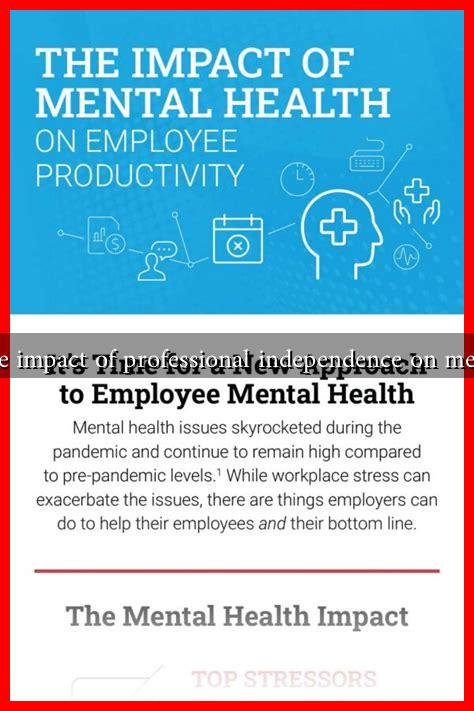-
Table of Contents
- The Impact of Professional Independence on Mental Health
- Understanding Professional Independence
- The Positive Effects of Professional Independence on Mental Health
- Case Studies Highlighting the Benefits
- The Risks of Lack of Professional Independence
- Strategies to Enhance Professional Independence
- Conclusion
The Impact of Professional Independence on Mental Health
In today’s fast-paced and often demanding work environment, the concept of professional independence has gained significant attention. Professional independence refers to the ability of individuals to make decisions and take actions in their work without undue influence from external pressures. This autonomy can have profound effects on mental health, influencing everything from job satisfaction to overall well-being. In this article, we will explore the various dimensions of professional independence and its impact on mental health.
Understanding Professional Independence
Professional independence is characterized by several key elements:
- Autonomy: The freedom to make decisions regarding one’s work.
- Self-direction: The ability to set personal goals and pursue them without external constraints.
- Accountability: Taking responsibility for one’s actions and decisions.
These elements contribute to a sense of ownership over one’s work, which can significantly affect mental health outcomes.
The Positive Effects of Professional Independence on Mental Health
Research has shown that professional independence can lead to numerous positive mental health outcomes:
- Increased Job Satisfaction: Employees who feel they have control over their work are generally more satisfied. A study published in the Journal of Occupational Health Psychology found that autonomy is a strong predictor of job satisfaction.
- Reduced Stress Levels: Autonomy can help mitigate stress. When individuals can make their own decisions, they are less likely to feel overwhelmed by external pressures.
- Enhanced Creativity: Professional independence fosters an environment where creativity can flourish. Individuals are more likely to think outside the box when they are not constrained by rigid guidelines.
- Improved Mental Resilience: Having control over one’s work can enhance resilience, allowing individuals to cope better with challenges and setbacks.
Case Studies Highlighting the Benefits
Several organizations have recognized the importance of professional independence and have implemented policies to enhance it:
- Google: Known for its flexible work environment, Google allows employees to spend 20% of their time on projects of their choosing. This autonomy has led to innovations like Gmail and Google News, while also improving employee satisfaction and mental health.
- Buffer: This social media management platform operates with a fully remote team, giving employees the freedom to work from anywhere. Buffer’s commitment to transparency and autonomy has resulted in high employee engagement and low turnover rates.
The Risks of Lack of Professional Independence
While professional independence has many benefits, a lack of it can lead to negative mental health outcomes:
- Burnout: Employees who feel micromanaged or lack control over their work are at a higher risk of burnout. The World Health Organization has recognized burnout as an occupational phenomenon, emphasizing the need for autonomy in the workplace.
- Increased Anxiety: Constant oversight and lack of decision-making power can lead to heightened anxiety levels, as employees may feel they are under constant scrutiny.
- Decreased Motivation: When individuals feel they have no control over their work, their intrinsic motivation can diminish, leading to lower productivity and engagement.
Strategies to Enhance Professional Independence
Organizations can take several steps to promote professional independence among their employees:
- Encourage Decision-Making: Allow employees to make decisions related to their work, fostering a sense of ownership.
- Provide Flexible Work Arrangements: Offering options for remote work or flexible hours can enhance autonomy.
- Support Professional Development: Investing in training and development can empower employees to take charge of their careers.
Conclusion
Professional independence is a crucial factor in promoting mental health in the workplace. By fostering autonomy, organizations can enhance job satisfaction, reduce stress, and improve overall well-being among employees. Conversely, a lack of professional independence can lead to burnout, anxiety, and decreased motivation. As the modern workplace continues to evolve, prioritizing professional independence will be essential for both employee mental health and organizational success. For more insights on workplace mental health, you can visit MentalHealth.gov.

